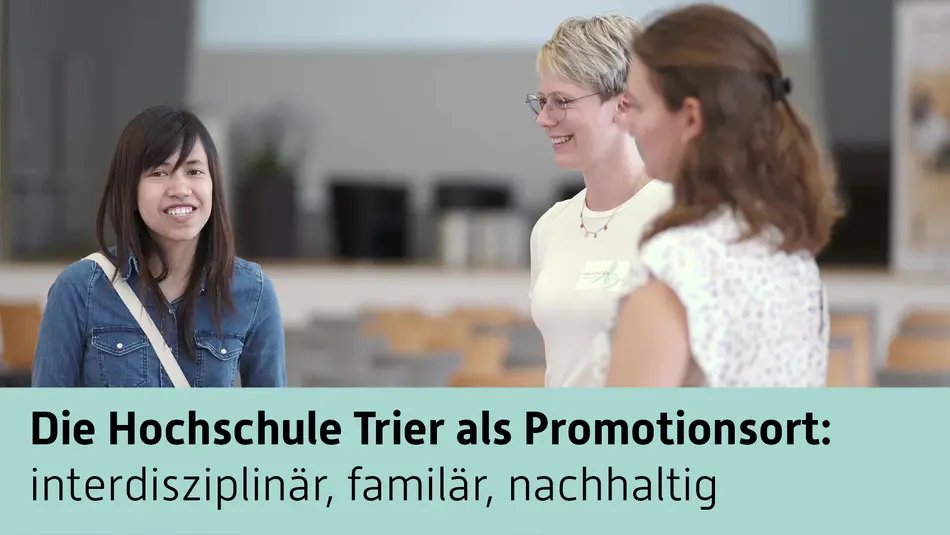Trier University of Applied Sciences is deeply committed to fostering the talents of young researchers. Across all seven faculties — Building + Living, Design, Computer Science, Engineering, Environmental Planning/Environmental Technology, Environmental Economics/Environmental Law, and Business — we conduct high-performance, application-oriented research in collaboration with regional and global partners.
Pursuing a doctorate at Trier University of Applied Sciences means integrating regional examples and applications with the broader societal challenges of health, digitalization, and sustainability. Developing digital services for stroke patients, calculating the CO2 emissions of
software, and assessing the ecological sustainability of poplar forests as a source of raw materials are just some examples of doctoral work at Trier University.
Collaboration with regional companies and local authorities ensures that the doctoral research results are directly applicable in industry and society. At the same time, supra-regional networking with universities, associations, and institutes ensures that project work is integrated
into the international research community.

Please note: Information will be sent to Youtube/Google as soon as you start the video. For further information visit Google Privacy.
The video was filmed as part of the Trier University of Applied Sciences International project and made available with permission.
Laboratories and working groups, such as the motor or insect laboratories, along with interdisciplinary research colleges, facilitate doctoral studies within a network. Individual projects are supervised in coordination with industry and university partners, focusing on topics from the research areas. The personality of the doctoral candidates shapes the research format and approach. A diverse support program, including science speed dating, mulled wine hikes in the beautiful natural surroundings, museum visits, and excursions to partner universities, enriches the doctoral experience at Trier University of Applied Sciences.

The Fika break, inspired by the Swedish tradition of a break with coffee and pastries, is central to the interdisciplinary networking of doctoral students across the university. It serves as a platform for engaging in scientific exchange across different disciplines. Here, presentation techniques, scientific communication, and discussion culture are practiced and reflected upon in a relaxed atmosphere. This initiative is from Trier University International.
The cooperative doctorate at Universities of Applied Sciences (UASs) is distinguished by its combination of knowledge transfer between university research, applied research, and industrial application. This is specifically addressed in the supervision of theses and doctoral counseling.
Currently, almost 90 doctoral students are working on innovations for science, business, and society at the Trier Main Campus, the Design Campus, and the Birkenfeld Environmental Campus. This is made possible through close cooperation with universities both in Germany and abroad.
Doctoral students benefit from a wide array of higher education and networking opportunities, which are supported by the departments as part of the doctoral coordination and partner projects "House of Profs", "HAW International", Didactics & E-Learning, and the library. Joint
events are organized through partner universities in the region, and additional educational and networking opportunities are available online. Trier University of Applied Sciences actively participates in the cross-university network KO-PROM RLP, which offers educational and networking opportunities for doctoral students throughout the state via the Ko-Prom RLP platform.
The university's course offerings focus on the area of higher education didactics to prepare doctoral candidates for an academic career and to support teaching activities alongside their doctoral studies with pedagogical expertise.
Supervision of doctoral theses is carried out in cooperation with a university professor, who, from a university perspective, supports the application-oriented research interest in collaboration with the supervisor from the university of applied sciences.
The dissertation project can be carried out individually, within laboratory and working groups, or as part of research colleges. Special workshops for supervisors focus on "academic mentoring".
A supervisory agreement between the doctoral candidate and the supervisor specifically considers the doctoral plan and the career aspirations of the doctoral student.
Doctoral counseling is available across all locations to all doctoral students of Trier University of Applied Sciences, as well as to supervisors, mentors, and prospective candidates with a desire to pursue a doctorate. Doctoral counseling is provided individually and confidentially as needed, online or in-person, and covers all topics related to doctoral studies.
Prospective candidates are supported in finding topics and supervisors. Doctoral students can seek advice on funding opportunities, teaching and networking offers, possibilities for studying abroad, coaching, well-being, and project management. Additionally, supervisors have the opportunity to learn about funding programs for doctorates, hiring procedures, best practices in academic mentoring, and the structuring of supervisory agreements.
The educational and advisory program for doctoral students integrates modern concepts of mental health and self-management, which are essential for a future academic career or continued employment in industry as future leaders.
In the PhD mentoring programme NextStep, respectful communication, knowledge exchange, career planning, and reflection on professional perspectives are facilitated individually.
In addition to third-party funding in projects, dissertations are financed through scholarships or industrial activities. Under the Rhineland-Palatinate research initiative, promotions can be supported over a short period with personnel and material resources. Information on this can be obtained from the Doctoral Coordination Office, where applications are also submitted.
Internally, the Nikolaus Koch Doctoral Scholarship is announced annually for doctoral students at the Trier location.
Costs for participating in European conferences can be applied for/covered through the DAAD HAW Scholarship for Congress and Trade Fair Travel. The Trier University of Applied Sciences library provides information on funding opportunities for publication costs as part of the Open Access Publication Fund.
Cooperative doctoral candidates at Trier University of Applied Sciences require confirmation of acceptance as a doctoral candidate at a university with the right to award doctorates, in Germany or internationally (typically a university).
Candidates have the option to choose between enrollment, which includes a semester ticket and reduced cafeteria prices, and registration. Enrollment is subject to a fee that varies depending on the university location. For registration, a one-time fee for an ID card must be paid. Re-registration for enrolled status must occur within the enrollment deadlines for students.
The state of Rhineland-Palatinate is preparing to introduce the independent right to award doctorates at Universities of Applied Sciences (UAS). Information on the current status, the content of the doctoral clusters, and the timetable can be found on the following page:
↦ Information page on the independent right to award doctorates at HAW in RLP (after login)
Remark: The information is only available in German. A translation to English is in preparation.
You are leaving the official website of Trier University of Applied Sciences